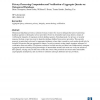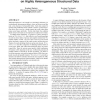721 search results - page 58 / 145 » Providing ranked relevant results for web database queries |
SIGIR
2008
ACM
13 years 7 months ago
2008
ACM
Some applications have to present their results in the form of ranked lists. This is the case of many information retrieval applications, in which documents must be sorted accordi...
PET
2009
Springer
14 years 2 months ago
2009
Springer
: © Privacy-Preserving Computation and Verification of Aggregate Queries on Outsourced Databases Brian Thompson, Stuart Haber, William G. Horne, Tomas Sander, Danfeng Yao HP Labor...
INTR
2010
13 years 6 months ago
2010
Purpose – Web search engines are frequently used by people to locate information on the Internet. However, not all queries have an informational goal. Instead of information, so...
SIGIR
2009
ACM
14 years 14 days ago
2009
ACM
There has been a lot of work on evaluating and improving the relevance of web search engines. In this paper, we suggest using human computation games to elicit data from players t...
WEBDB
2010
Springer
14 years 27 days ago
2010
Springer
Wikipedia infoboxes is an example of a seemingly structured, yet extraordinarily heterogeneous dataset, where any given record has only a tiny fraction of all possible fields. Su...


